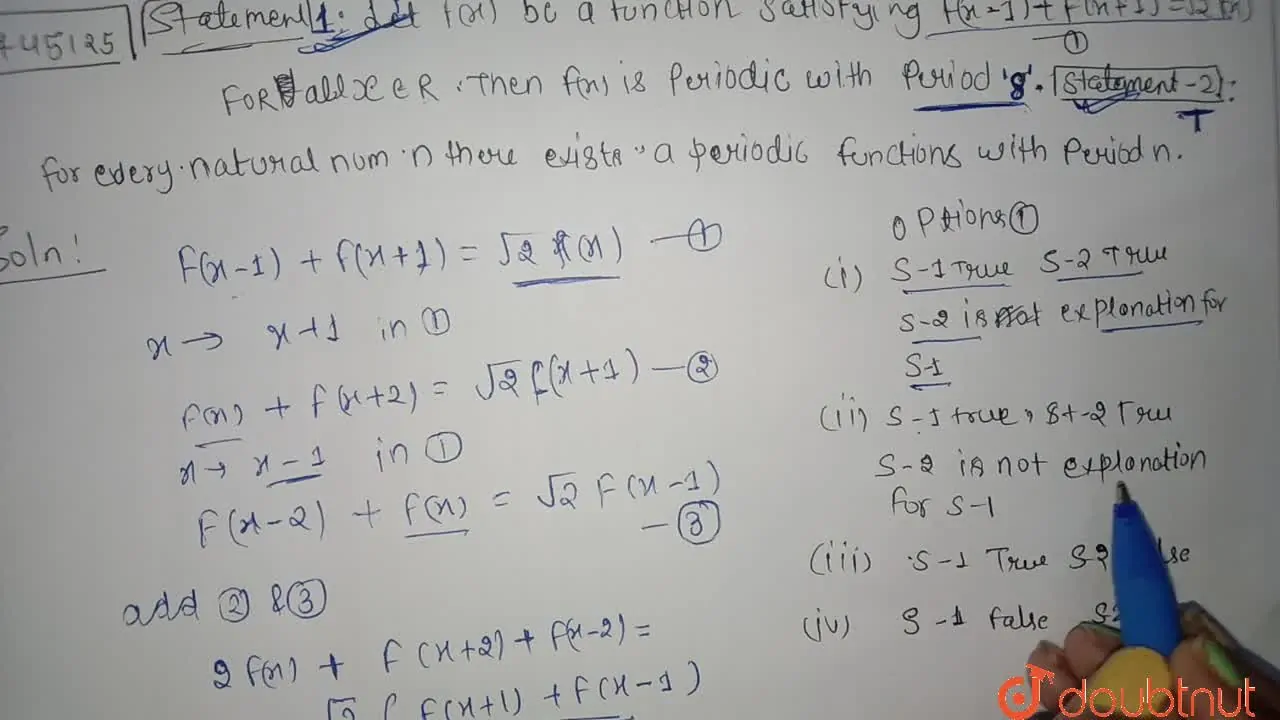Statement -1: Let f(x) be a function satisfying f(x−1)+f(x+1)=√2f(x) for all x∈R . Then f(x) is periodic with period 8. Statement-2: For every natural number n there exists a periodic functions with period n.
Statement-1 is True, Statement-2 is True, statement-2 is a correct explanation for the statement-1 .
Statement-1 is True, Statement-2 is True, statement-2 is not a correct explanation for the statement-1 .
Statement-1 is True, Statement-2 is False.
Statement-1 is False , Statement-2 is True.
The correct Answer is:B
Function f(x) satisfies the relation.
f(X−1)+f(x+1)=√2f(x) for all x. ……..(i)
Replacing x by x+1 in (i), we get .
f(x)+f(x+2)=√f(x+1) ………(ii)
Replacing x by (x-1) in (i) ,we get
f(x−2)+f(x)=√2f(x−1) …..(iii)
Adding (ii) and (iii) , we get
2f(x)+f(x+2)+f(x−2)=√2(f(x−1)+f(x+1))
⇒2f(x)+f(x+2)+f(x−2)=√2×√2f(x)
⇒f(x+2)+f(x−2)=0
Replacing x by x+2 in (ii) we get
f(x+4)+f(x)−0
Replacing x by x+4 in (iv) we get
f(x+8)+f(x+4)=0
Subtracting (iv) from (v), we get
f(x+8)−f(x)=0⇒f(x)=f(x+8)
So, f(x) is a periodic function with period 8.
Hence, statement-1 is true.
We know that g(x)=x-[x] is a periodic function with period
1. Therefore, for any n∈N,ϕ(x)=xn−[xn] is periodic with period n.
Related Playlists
- BOOK - OBJECTIVE RD SHARMA ENGLISHCHAPTER - REAL FUNCTIONS EXERCISE - Exercise94videos
REAL FUNCTIONS
- BOOK - OBJECTIVE RD SHARMA ENGLISHCHAPTER - REAL FUNCTIONS EXERCISE - Chapter Test58videos
REAL FUNCTIONS
- BOOK - OBJECTIVE RD SHARMA ENGLISHCHAPTER - REAL FUNCTIONS EXERCISE - Section I - Solved Mcqs95videos
REAL FUNCTIONS
- BOOK - OBJECTIVE RD SHARMA ENGLISHCHAPTER - PROPERTIES OF TRIANGLES AND CIRCLES CONNECTED WITH THEMEXERCISE - Chapter Test55videos
PROPERTIES OF TRIANGLES AND CIRCLES CONNECTED WITH THEM
- BOOK - OBJECTIVE RD SHARMA ENGLISHCHAPTER - SCALAR AND VECTOR PRODUCTS OF THREE VECTORS EXERCISE - Exercise63videos
SCALAR AND VECTOR PRODUCTS OF THREE VECTORS
Similar Questions
If f(2+x)=a+[1−(f(x)−a)4]14 for all x∈R,then f(x) is periodic with period
View SolutionIf f(x) is periodic function with period, T, then
View SolutionThe function f(x)=|cos| is periodic with period
View SolutionLet f be a differentiable function satisfying
[f(x)]n=f(nx) for all x∈R.
Then, f'(x)f(nx)View SolutionThe function f(x)=x−[x] is a periodic with period.
View SolutionIf f(x+10)+f(x+4)=0, there f(x) is a periodic function with period
View SolutionLet f be a function satisfying f(x+y)=f(x)+f(y) for all x,y∈R. If f(1)=k then f(n),n∈N is equal to
View SolutionIf a function satisfies f(x+1)+f(x−1)=√2f(x), then period of f(x) can be
View SolutionIf f:R→[0,∞)is a function such that f(x−1)+f(x+1)=√3f(x), then prove that f(x) is periodic and find its period.
View SolutionIf f(x) satisfies the relation f(x)+f(x+4)=f(x+2)+f(x+6) for allx, then prove that f(x) is periodic and find its period.
View Solution


